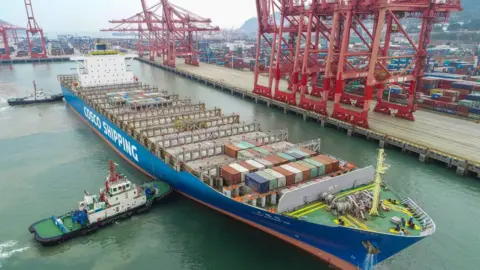Covid-19: Chinese trade grows as others struggle amid pandemic
 Getty Images
Getty ImagesChina has recorded strong growth in trade, while other major economies still struggle with the impact of coronavirus.
Exports in September rose 9.9%, while imports grew 13.2%, official data show.
The rush of imports cut China's usually meaty trade surplus - the amount by which exports exceed imports - to $37bn from $59bn in August.
Most other large economies are expected to suffer large contractions as lockdowns and public fear cut spending.
But the data suggests a rapid recovery in China from an initial reduction in overseas orders sparked by the pandemic.
China was the first country to be hit by the coronavirus outbreak, reporting the first cases late last year.
The world's second biggest economy saw a sharp decline in the first three months of 2020 amid strict lockdown measures, before bouncing back in July.
Analysts say the recovery in trade since then has been driven by a surge in international demand for home electronics, medical devices and textiles, including personal protective equipment.
However, they warn some of this demand could begin to fall.
In the year up to the end of September, China's combined imports and exports with other nations reached 23.12 trillion yuan ($3.4tn, £2.6tn), up 0.7% and reversing the hit the country took in the early days of the coronavirus pandemic.
In August, the Japanese economy was revealed to have shrunk at its fastest rate on record, partly because of a fall in exports. The US economy saw its fastest contraction in decades in July.
Meanwhile, the International Monetary Fund (IMF) is forecasting a somewhat less severe recession than it predicted in June for the global economy.
But the IMF says in its World Economic Outlook that the global economy is still in deep recession and the risk of a worse outcome than in its new forecast is "sizable".
The predicted global economic contraction is more moderate than the IMF envisaged four months ago, at 4.4%. That is followed by rebound of 5.2% next year, which is less than the previous prediction.
Next year's world downgrade is less than this year's upgrade.
The slightly less-bleak assessment reflects downturns in several large developed economies in the April-to-June quarter of the year that were not as severe as the IMF expected.
The return to growth in China, where the pandemic arrived first and was held back first, was stronger than expected.
China's biggest trading partner is the Association of Southeast Asian Nations, which includes Malaysia and Singapore.
Its next biggest customers were the European Union and US, China's General Administration of Customs said.
